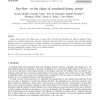Free Online Productivity Tools
i2Speak
i2Symbol
i2OCR
iTex2Img
iWeb2Print
iWeb2Shot
i2Type
iPdf2Split
iPdf2Merge
i2Bopomofo
i2Arabic
i2Style
i2Image
i2PDF
iLatex2Rtf
Sci2ools
Publication
Fun-Sort--or the chaos of unordered binary search
Usually, binary search only makes sense in sorted arrays. We show that insertion sort based on repeated "binary searches" in an initially unsorted array also sorts n elements in time (n2 log n). If n is a power of two, then the expected termination point of a binary search in a random permutation of n elements is exactly the cell where the element should be if the array was sorted. We further show that we can sort in expected time (n2 log n) by always picking two random cells and swapping their contents if they are not ordered correctly. c 2004 Elsevier B.V. All rights reserved.
| Added | 17 Dec 2010 |
| Updated | 17 Dec 2010 |
| Type | Journal |
| Year | 2004 |
| Where | DAM |
| Authors | Therese C. Biedl, Timothy M. Chan, Erik D. Demaine, Rudolf Fleischer, Mordecai J. Golin, James A. King, J. Ian Munro |
Comments (0)

